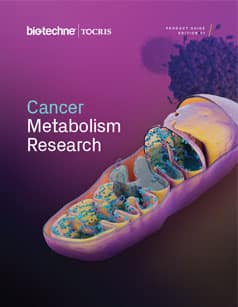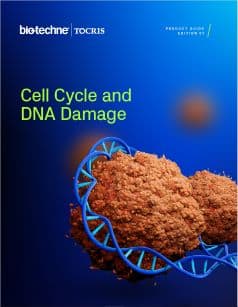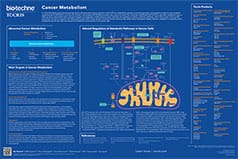Thymidylate Synthetase
Thymidylate Synthetase (TS) EC 2.1.1.45 is a highly conserved bifunctional enzyme responsible for the reductive methylation of dUMP to dTMP, required for DNA synthesis. TS also functions as a RNA binding protein and its protein levels are linked to chemoresistance in cancer.
Thymidylate Synthetase Inhibitors |
|
|---|---|
| Cat. No. | Product Name / Activity |
| 3257 | 5-Fluorouracil |
| Thymidylate synthetase inhibitor | |
| 6185 | Pemetrexed |
| Thymidylate synthetase inhibitor, also inhibits dihydrofolate reductase, GARFT and AICART | |
Thymidylate Synthetase (TS) EC 2.1.1.45 is a highly conserved bifunctional enzyme, that catalyzes the conversion of deoxyuridine monophosphate (dUMP) and 5,10-methylenetetrahydrofolate to deoxythymidine monophosphate (dTMP) and dihydrofolate. This is an essential metabolic reaction, producing dTMP required for DNA synthesis and dihydrofolate, required for production of purines and pyrimidines and therefore DNA and RNA.
TS also functions as a RNA binding protein, able to regulate its own protein levels through translational autoregulatory feedback mechanisms. It also binds to other RNAs including p35 and myc family transcription factors, leading to a regulatory role in cell cycle and apoptosis.
Inhibition of TS is a mechanism of action of some cytotoxic drugs for cancer treatment including fluoropyrimidines. Inhibition causes an imbalance in deoxynucleotides, leading to increased levels of dUMP causing DNA damage and triggering cell death through p53 and apoptosis. TS activity and/or protein expression correlates with response to fluoropyrimidines: cancer cell lines that express high levels of TS show increased resistance to the cytotoxic and antitumor effects of fluoropyrimidines.
External sources of pharmacological information for Thymidylate Synthetase :
Literature for Thymidylate Synthetase
Tocris offers the following scientific literature for Thymidylate Synthetase to showcase our products. We invite you to request* your copy today!
*Please note that Tocris will only send literature to established scientific business / institute addresses.
Cancer Metabolism Research Product Guide
This product guide reviews some of the main areas in cancer metabolism research and lists around 150 products that can be used to investigate metabolic pathways in cancer including:
- Glycolysis
- Tricarboxylic Acid Cycle
- Lipidogenesis
- 1C Metabolism and Nucleic Acid Synthesis
- Drivers of Metabolic Reprogramming
- pH and Redox Balance
Cell Cycle and DNA Damage Research Product Guide
This product guide provides a review of the cell cycle and DNA damage research area and lists over 150 products, including research tools for:
- Cell Cycle and Mitosis
- DNA Damage Repair
- Targeted Protein Degradation
- Ubiquitin Proteasome Pathway
- Chemotherapy Targets
Cancer Metabolism Poster
This poster summarizes the main metabolic pathways in cancer cells and highlights potential targets for cancer therapeutics. Genetic changes and epigenetic modifications in cancer cells alter the regulation of cellular metabolic pathways providing potential cancer therapeutic targets.
Cell Cycle & DNA Damage Repair Poster
In normal cells, each stage of the cell cycle is tightly regulated, however in cancer cells many genes and proteins that are involved in the regulation of the cell cycle are mutated or over expressed. This poster summarizes the stages of the cell cycle and DNA repair. It also highlights strategies for enhancing replicative stress in cancer cells to force mitotic catastrophe and cell death.





